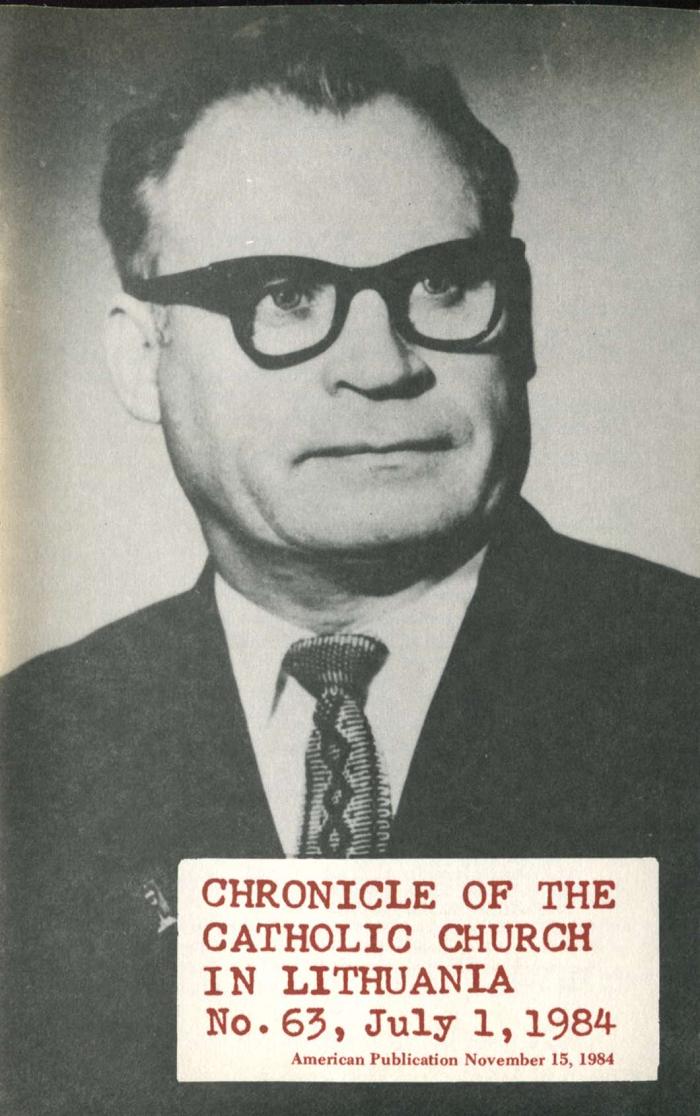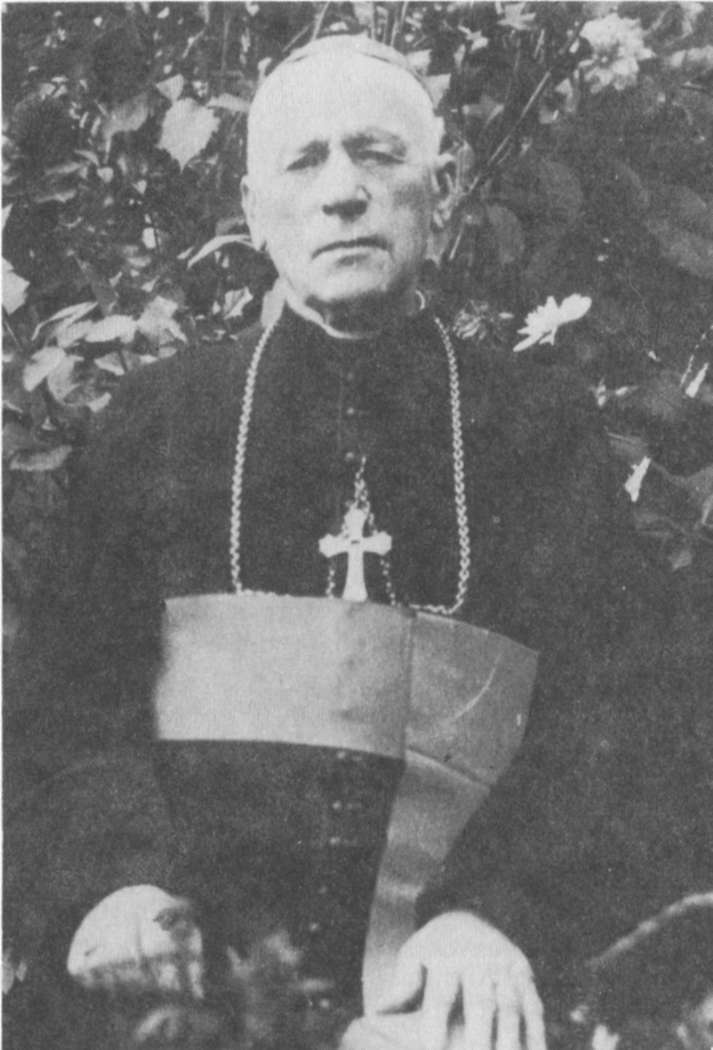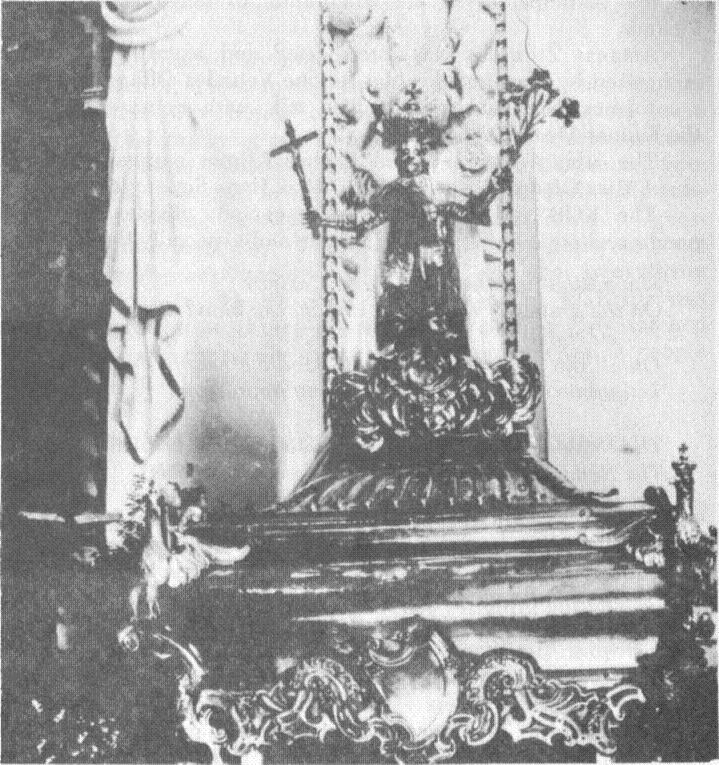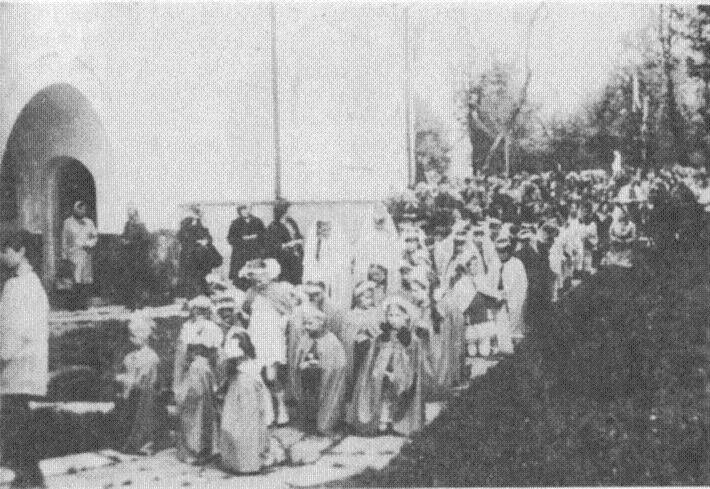
Appearing since 1972 If you can, reproduce this! Read this and pass it on!
This issue is dedicated to honoring the fifty-year jubilee of the first Lithuanian Eucharistic Congress, and the consecration of the nation to the Sacred Heart of Jesus.
CHRONICLE OF THE CATHOLIC CHURCH IN LITHUANIA, NO. 63 
In this issue:
1. To His Excellency, Bishop-Designate Baltakis
3. Echoes of the Jubilee Year of Saint Casimir
4. Are There Any Grounds for accusing Msgr. Olšauskas of Murder?
5. Letter of Father Jonas Danyla to the Editors of the Rayon Newspaper, "Pirmyn"
6. We Are Grateful for the Sacrific
Lithuania July 1, 1984
Most honorable Bishop of our nation, we sincerely congratulate you on your appointment by the Holy Father for such noble duties — to care for the religious life of our fellow countrymen, the living Church of our nation. Catholic Lithuania prays for God's abundant blessings on your Excellency, and commends herself to your love and concern.
On July 1, 1934, Lithuania was consecrated to the Sacred Heart of Jesus. For fifty years the Heart of Jesus — its Great Love — has been leading Lithuania and her Church on the hard road of adversity. Looking back at the years which have passed, we must thank the Heart of Jesus that in confusion, difficulties and persecutions, such as the Church in Lithuania had not experienced for six centuries, it has not, thanks to the support of God's love, lost its way. It has held up under the oppression of the atheists, and survived unbowed.
Let us recall the Stalin era: Archbishop Mečislovas Reinys, Bishop Teofilius Matulionis and Bishop Pranas Ramanauskas were imprisoned; Bishop Borisevičius was shot; a great number of the priests went the way of the Gulag; churches, seminaries, monasteries and convents were confiscated and closed. The nation was left without suitable leaders, without a religious press and without catechism for the children.
Priests were forbidden not only to catechise, but also to visit the faithful. A pastor who wanted to invite a priest to help out on religious occasions had to go the way of the cross in order to obtain government permission: one was disloyal to the atheistic regime, another's sermons were too good, etc. As a result of the atheistic psychosis during the last years of Krushchev's regime, a scant couple of seminarians in each class could study at the seminary in Kaunas. Two bishops, Julijonas Steponavičius and Vincentas Sladkevičius were banned from their diocese; and in their places, Vicars Capitular were sent to the Second Vatican Council.

Archbishop Teofilius Matulionis, of Kaišiadorys, imprisoned for nearly a quarter-century during the Stalin era.
And miracle of miracles, under such conditions, a religious revival! The seed of the persecution of the nation during the post-War years and of the sufferings of the sons and daughters of the Church was not in vain; it is bearing fruit. The efforts of the atheists were in vain. It is impossible to rewrite history.
Kaunas
On March 4, 1984, a small group of young people gathered from various places in Lithuania at the tomb of Saint Casimir in the Church of SS. Peter and Paul in Vilnius to pray, read verse and sing hymns.
At the beginning of June, 1984, the interrogations began in KGB offices, at work and in school, for participation in the commemoration of the Jubilee of Saint Casimir, and in the program which took place on that occasion.
From Kaunas Middle School 7, KGB Agent Jonas Matulevičius took primary grades teacher Miss Laimutė Truskauskaitė to KGB headquarters for interrogation. The chekist was displeased because

Tomb of St. Casimir over the high altar of the Church of SS. Peter and Paul in Antakalnis, Vilnius. The saint's remains were transferred here in 1953, when the Soviet authorities confiscated the original resting place, the Cathedral of Vilnius.
Miss Truskauskaitė had participated in the Saint Casimir celebration in Vilnius, and he scolded her for writing letters to prisoners, some of which lay undelivered on a desk in the office. Matulevičius tried to pressure Miss Truskauskaitė into writing a statement promising to mend her ways. The subject of the interrogation, explaining that according to her beliefs it was the duty of every Catholic to do so, refused to write any assurances.
The atheistic government, having gone ten years without arresting any priests, and having now arrested and sentenced to long terms of imprisonment two of the most exemplary priests in Lithuania, Alfonsas Svarinskas and Sigitas Tamkevičius, has seen that among the believing faithful, the moral authority of the arrested priests, called extremists by the atheists, has only grown. They have been unable in the press to give any arguments proving the "guilt" of the priests. The atheists are trying to diminish the effect of the harsh sentence on the public by dredging up old histories from the forgotten past. Thev are using for this the pre-war case of Msgr. Konstantinas Olšauskas, on which a two-part Lithuanian television film, Devynai nuopuolio ratai (Descent to the Ninth Circle) appearing in the middle of May, was based.
With this film, as the atheists themselves testify (Kalba Vilnius — Vilnius Speaking, May), an attempt is being made to tell the public: "Those convicted extremist priests, beloved and defended by you, are just as much criminals as was Msgr. Olšauskas; even in your Independent Lithuania the same kind of extremist priest was sentenced."
Hence, it is important that the Lithuanian people, constantly deceived by atheistic propaganda, know the truth about the charges fabricated by Nationalist Party liberals who were trying to thwart the Catholic movement in Lithuania. With the passage of time, new information has come to light showing that the allegation of murder aimed at Msgr. Olšauskas was without grounds.
To The Editors of the Molėtai Rayon newspaper, Pirmyn:
In the February 5 issue of your newspaper (Nr. 16) an article by Kęstutis Deksnys was printed, entitled, "Atheism, Morality and Religion". Even though the editors are lavish in their praise of the article's author, saying that he, "is impressive in his research and his ability to hold the readers' interest", nevertheless, the more astute reader will notice immediately that he lacks the most elementary facts, especially historical.
Here are a few facts: (1) The author accuses the Church of teaching that "all government is from God". If the Church did teach this, there would be no Christians, since the Caesars forbade them to worship Christ as God, and the Christians would have obeyed them and reverted to idol worship, but they did not do so, and preferred rather to go to their death... they believed THAT ONLY JUST GOVERNMENT AND ITS JUST REQUIREMENTS COME FROM GOD. If the government or its requirements are unjust, then there is no duty to obey; on the contrary, THERE IS A DUTY TO DISOBEY. The Christians of all ages know that: "Better to obey God, rather than men." (Acts 5, 29)
Deksnys alleges that the popes organized the Crusades desiring "to seize new lands and force the inhabitants of several more lands to pay tribute and to amass new wealth." Is this how it really was?
On March 25,1984, Mečislovas Jurevičius of Šiauliai was released after three years of strict regime camp. He was met at the gates of the Chelyabinsk by friends from Lithuania, and by the 27th, all were back in Lithuania.
On March 7, Jurevičius' wife had sent him 70 rubles for the journey. However, to this day, the money has not reached Jurevičius, even though he has been home for three months.
Before Jurevičius came home, the security police began to question his wife and friends. In the middle of March, 1984, his daughter-in-law, Mrs. Loreta Jurevičienė, was questioned at work, and an attempt was made to recruit her. When the prisoner came home, Mrs. Jurevičienė was again summoned for interrogation, and questioned about people visiting Jurevičius. The KGB tried again to recruit her as an informer. Mrs. Jurevičienė refused to cooperate, and refused to keep silent about the interrogation.
Father Sigitas Tamkevičius writes:
Here it is, the second month since I settled into my new surroundings. I'm working in the kitchen, doing uncomplicated work... Divine Providence has made it possible for me to perform a kind of work which teaches me to sympathize with and to appreciate those who, at first sight, seem to be doing quite meaningless work, which in the eyes of God is no less meritorius than the big jobs. I offer everything to the Lord, and I am convinced that my present work is no less useful to the Church and to the faithful than everything which I have done for twenty years. What a comfort to know this! Our Heavenly Father sees everything, and judges everything.
No one interfered with my work, so in my thoughts, I can constantly by with God and in Him, with those who were so near and dear to my heart when I was free. When you are with God, please remember me, too, so that I might know how to make everything always meaningful, and offer it to God, that in my present life there might not be a single empty day. It would be a

On June 6, 1983, one month after the arrest of Father Sigitas Tamkevičius, his prishioners in Kybartai went around the church in procession on their knees, praying for their beloved pastor.
tragedy if I did not know how to inject meaning into my present life. I would be like the man who received a talent and buried it in the ground, earning nothing...
Kapčiamiestis (Lazdijai rayon)
On July 22, 1983, the pastor of the parish of Kapčiamiestis, Father Ignas Plioraitis, was summoned to the Lazdijai Rayon Prosecutor's Office to see Prosecutor S.Žiautys. Since Father Plioriatis refused to write a statement, arguing that he felt himself to be innocent, Prosecutor Žiautys himself drafted it. Basing himself on material collected by Vice Chairman Liudas Vanagas, of the Lazdijai Rayon Executive Committee, Prosecutor Žiautys, in his statement, touched on the following questions:
"Why do you not get along with Vice Chairman Vanagas of the Rayon Executive Committee?"
"How does material from talks with government representatives get into the Chronicle; for example, your interview with Vanagas?" (See Chronicle No. 58 — Trans. Note)
"Why do you not submit information about religious festivals to the rayon government?"
"Why does your church committee not enter into a contract with the Rayon Executive Committee? Perhaps you, as pastor, are interfering in this matter, and causing the delay?
Vilnius
On May 22-23, 1984, ballots were being counted in the election of representatives to the Priests' Council of the Archdiocese of Vilnius. When Religious Affairs Commissioner Petras Anilionis was informed of the results of the voting, he severely reprimanded the administrator of the archdiocese, Father Algirdas Gutauskas, for conforming with the directive of Bishop Julijonas Steponavičius to conduct the elections by secret ballot, and for not interfering with the election to the Priests' Council of Fathers Algimantas Keina, Jonas Lauriūnas and Donatas Valiukonis.
Anilionis told Administrator Gutauskas whom he was supposed to appoint to the Priests' Council, and who should constitute the Board of Consultors. Of those elected to membership in the council, only one priest is suitable for the board of consultors in the opinion of Anilionis. Eight priests were elected to the Priests' Council, but Anilionis is allowing only six; he refuses to acknowledge two of the priests elected, Kazimieras Vasiliauskas and Jordanas Slėnys. If the aforesaid priests join the Priests' Council in spite of the interdict, Anilionis said, he would immediately move Father Vasiliauskas out of Vilnius, and release compromising pictures of Father Slėnys in the press.
Anilionis threatened the Apostolic Administrator of the Archdiocese of Vilnius, Bishop Julijonas Steponavičius, that for interfering in what was not his business, (i.e., the makeup of the Archdiocesan Priests' Council and Board of Consultors — Ed. Note), he would be exiled from Žagarė to a place where no one would be able to reach him. The commissioner was annoyed because priests of the archdiocese visit their bishop and associate with him.
Viduklė
On May 23, 1984, Class 11B Homeroom teacher, Mrs. Mikolaitienė, told her pupil, Miss Juratė Kaplanaitė, that because she had greeted a returned prisoner, and had prayed publicly in church with everyone else for the imprisoned pastor, Father Alfonsas Svarinskas, she would not be allowed to take final examinations. Vice Principal Mrs. S. Balutienė accused Juratė of anti-Soviet activity and called her morally degenerate, even though in parents' meetings, the girl used to be praised, and no fault had been found with her.
The parents took a petition to the Minister of Education, protesting against such behavior by the teachers. Only on the second try were they able to get in to see the minister for a short while, practically forcing their way in. The minister stated that he could do nothing, that he would have to investigate everything in person, and for that he had no time. "Most of the jurisdiction in this matter rests with the Rayon Department of Education, go see them," the Minister of Education told the parents.





